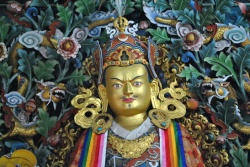Eternalism
Eternalism (rtag lta). The belief that there is a permanent and causeless creator of everything; in particular, that one's identity or consciousness has a concrete essence which is independent, everlasting and singular.
Eternalism (Skt. nitya dṛṣṭi; Wyl. rtag pa'i lta ba or Skt. nityānta; Wyl. rtag pa'i mtha') — one of the so-called 'two extremes', eternalism is the belief that there is a permanent and causeless creator of everything; in particular, that one's identity or consciousness has a concrete essence which is independent, everlasting and singular.
There are many different brands of eternalism; they can be classified into three hundred sixty views, sixty-two false positions, eleven systems, and so on. All can, however, be condensed into the five tarka, or speculative systems.[1]
Alternative Translations
- Absolutism (Geshe Thupten Jinpa)
- Permanence (Dharmachakra Translation Committee)
Notes
- ↑ Mipham Rinpoche - Shantarakshita, The Adornment of the Middle Way: Shantarakshita's Madhyamakalankara with Commentary by Jamgon Mipham, Translated by Padmkara Translation Group (Boston: Shambhala, 2005), p. 217.
